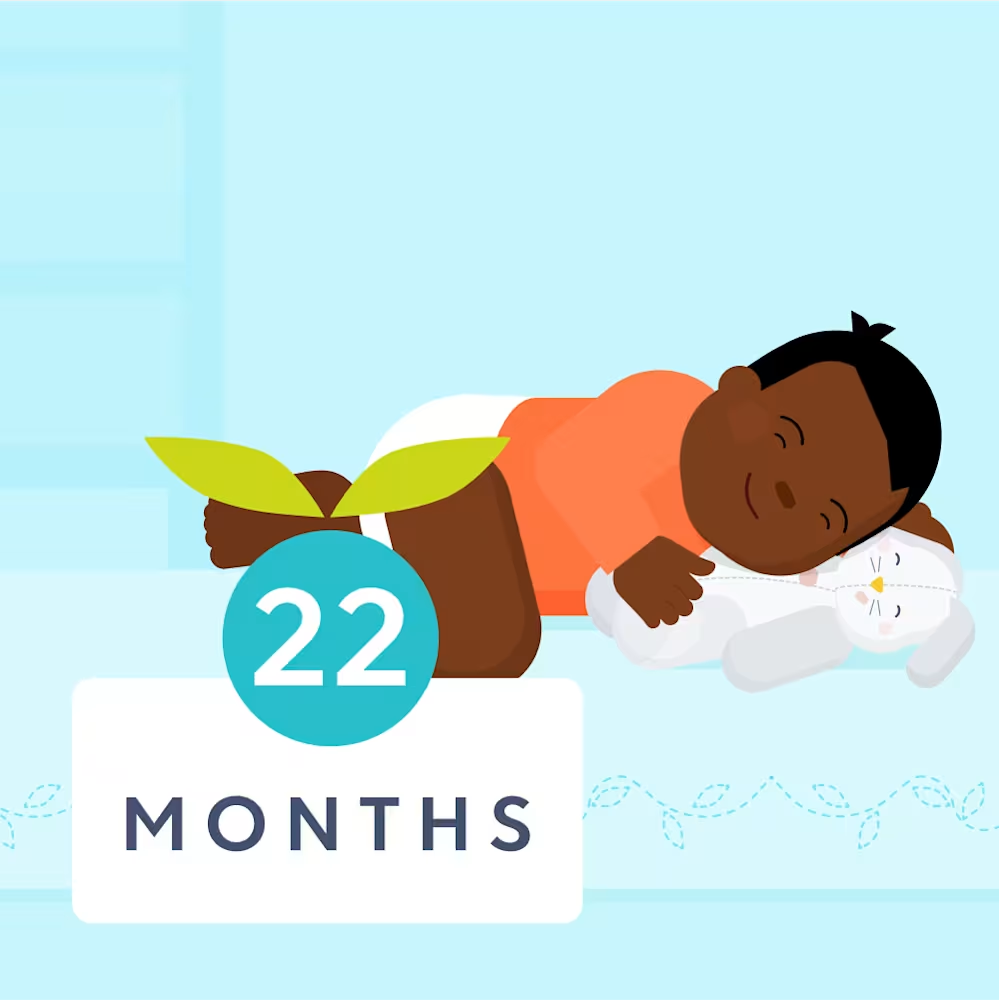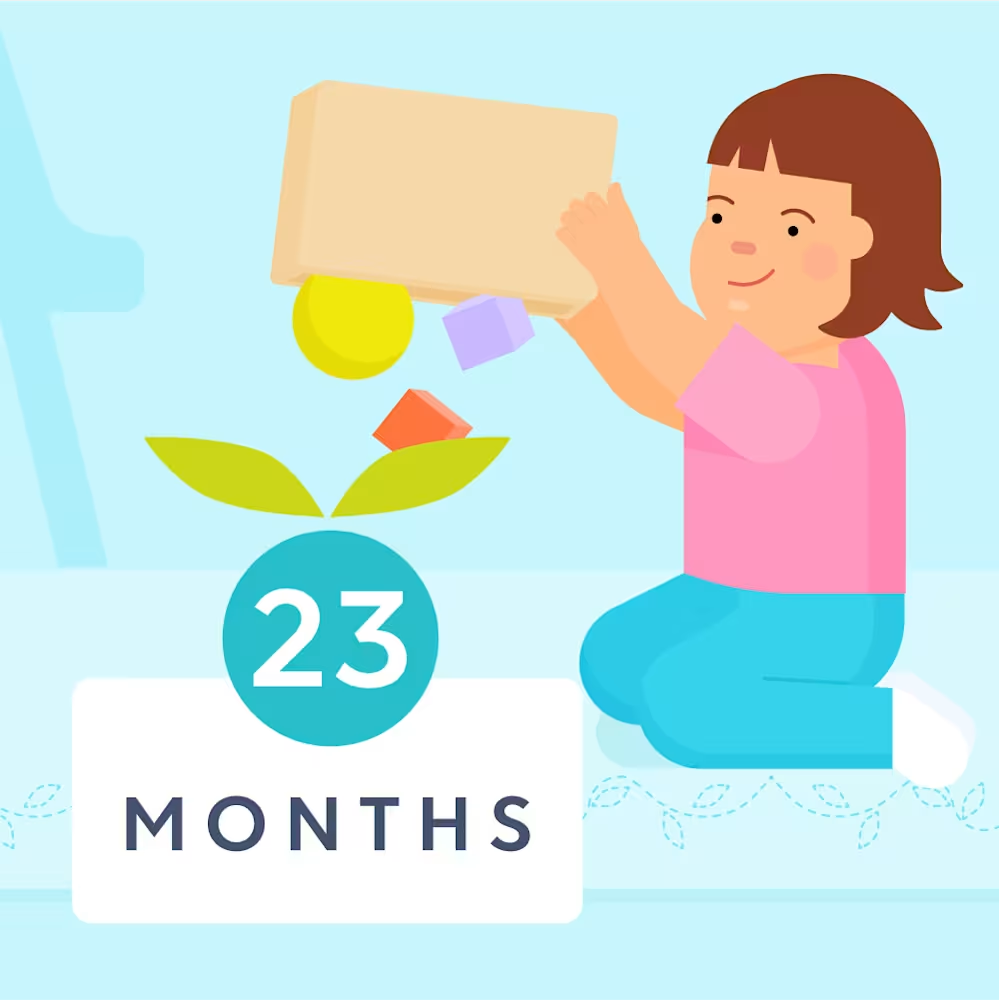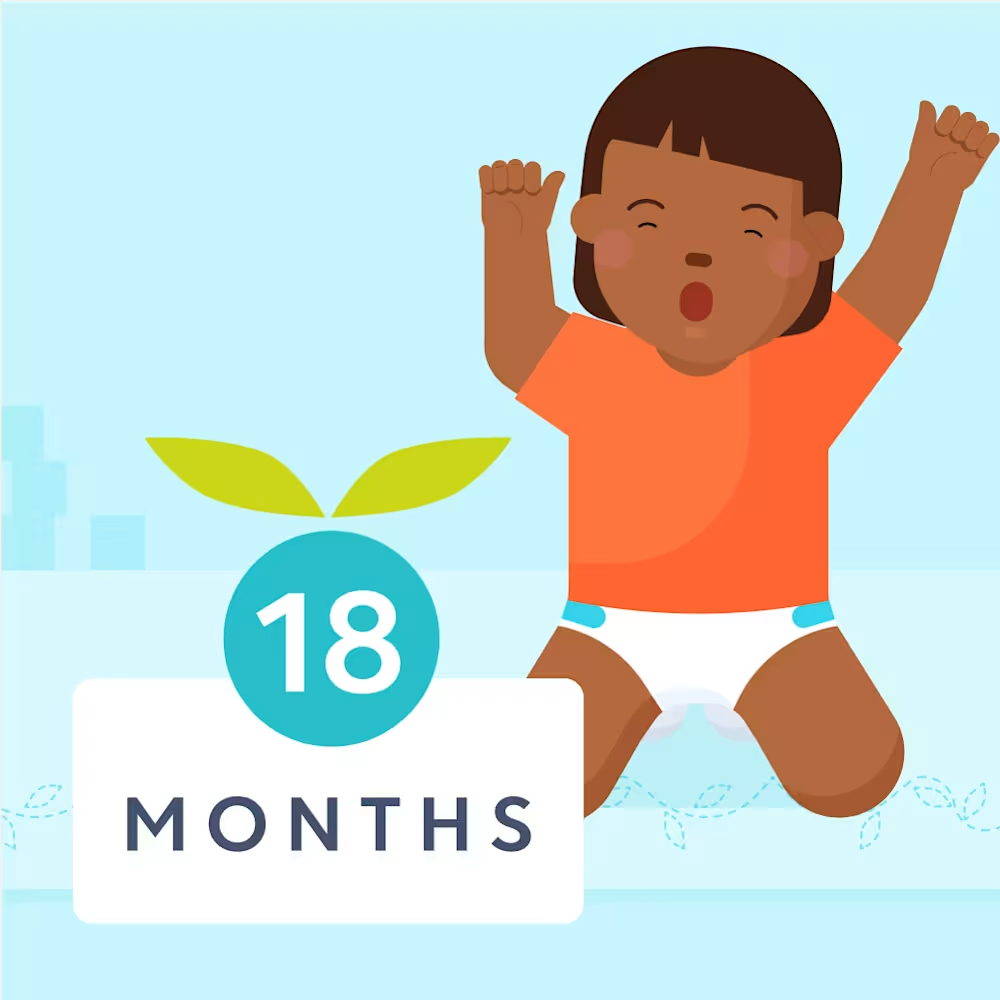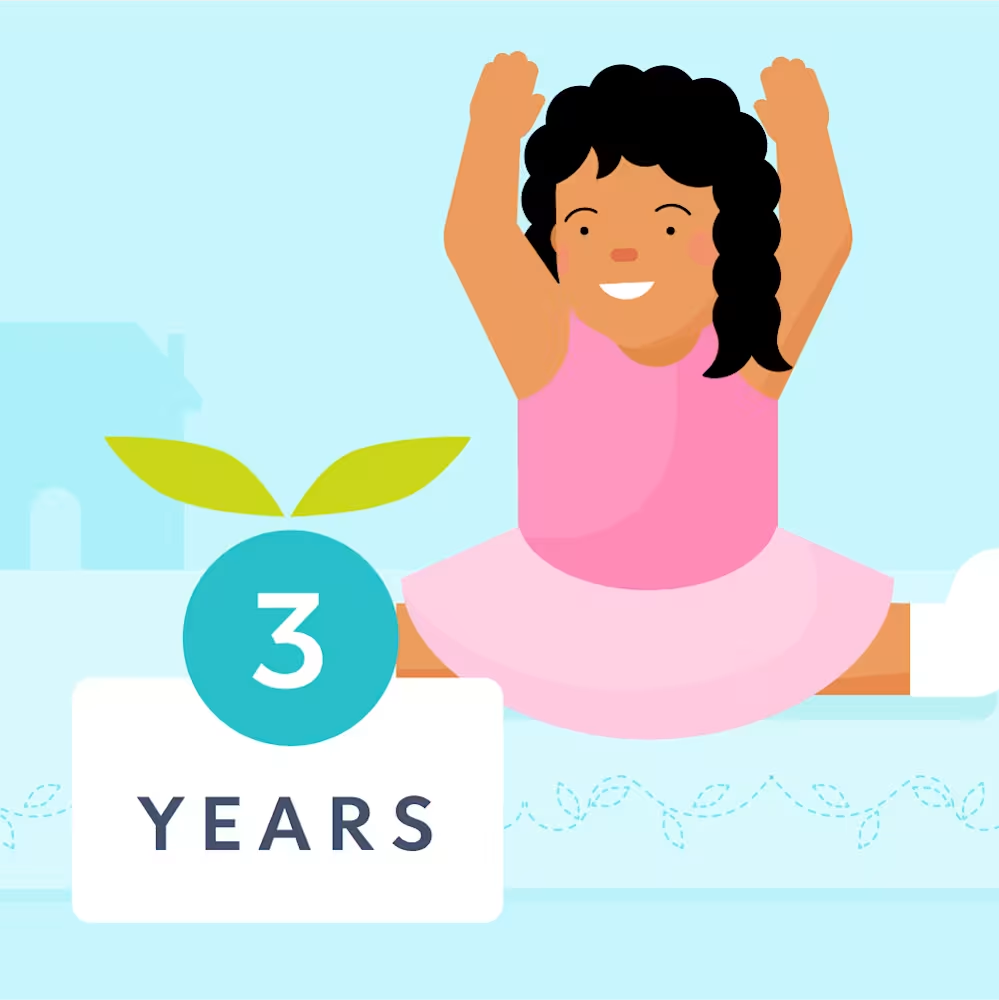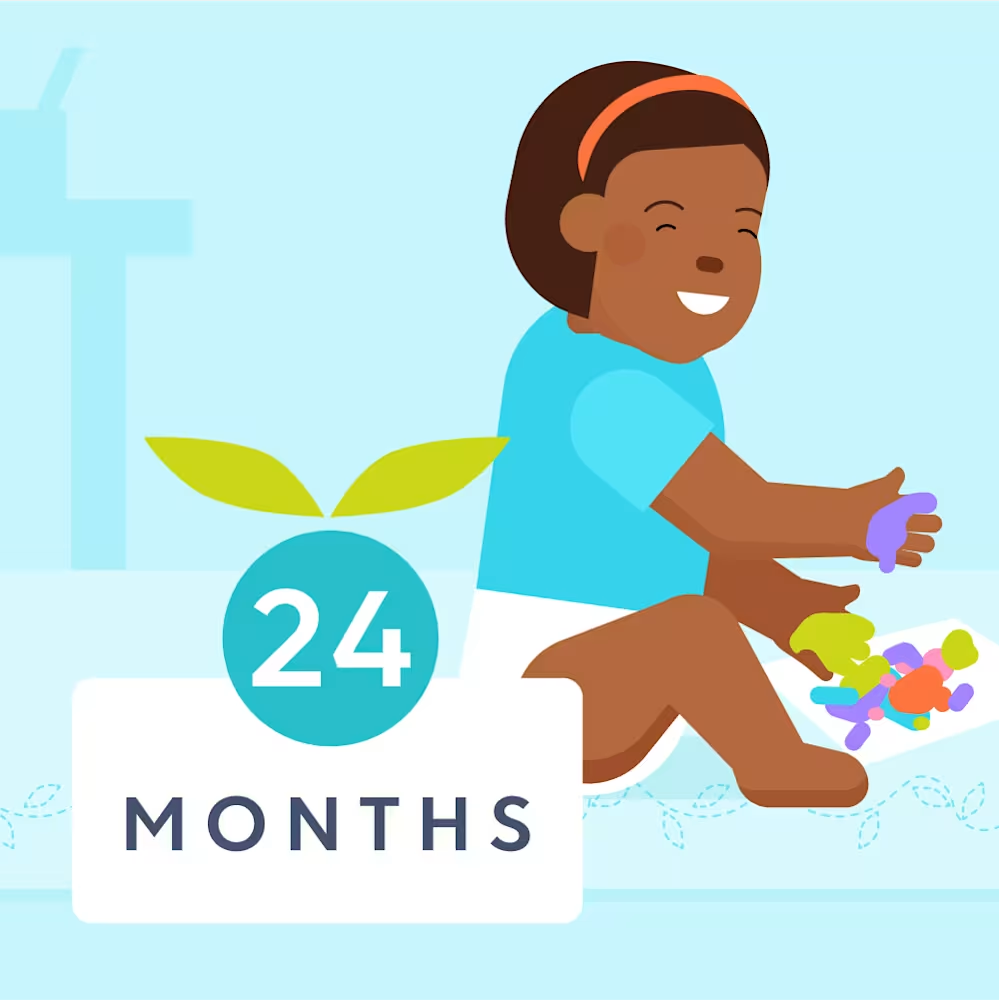25 month old sleep schedule: Bedtime and nap schedule
Updated Dec 16, 2025

Now that your child is 2, you may be searching for information on the dreaded “” and anticipating that your toddler’s normal sleep habits will go out the window any second now. Luckily, you can be assured that sleep regressions don’t happen to all children at prescribed ages, contrary to popular belief. However, we do tend to see periods of bumpy sleep at this age due to various factors.
In this article, we’ll provide you with the lowdown on toddler sleep regressions, give you tips for navigating naptime, and provide answers to frequently asked questions about toddler sleep.
How much should a 25 month old sleep?
At 2, the American Academy of Sleep Medicine recommends 11 - 14 hours [] of total sleep per day. This typically looks like 10 - 11 hours of overnight sleep and around 1.5 - 2.5 hours of daytime sleep during one midday nap. Note that some toddlers may need more or less sleep than others — and that’s OK!
Here's a quick overview of what you may expect when it comes to 25 month olds and sleep. Note that these figures are averages and should be used as guidelines.
Top sleep tips for 25 month olds
If your 25 month old is stalling or having tantrums at bedtime, rest assured that these are frustrating yet common toddler behaviors. It’s developmentally appropriate [] for children to push boundaries at 2! We often see this when little ones are tired at bedtime. Instead of embracing sleep, they may resist it by doing things like melting down or requesting more snacks.
If your child is in a phase of bedtime battles, we recommend evaluating if your child needs more time to wind down before sleeping. Children at 2 may need a longer bedtime routine (~45 minutes) in dim lighting to fall asleep more easily. You could start this elongated routine a little earlier than normal or push bedtime a bit later if that’s preferable. A later bedtime may help if your child typically doesn’t seem tired at their usual sleep time.
Another tactic that may help bedtime struggles is giving your little one a sense of control by offering age-appropriate choices. This may look like letting your child pick between two pairs of pajamas or giving them the choice of which book to read before getting into bed.
Sample 25 month old sleep schedule
Note: Sleep needs vary by child, and this chart should be viewed as an example.
Naptime schedule for a 2 year old
Children at 25 months typically nap once a day. At 2, children commonly need around 5.5 hours of awake time in the morning before their nap. However, toddlers may go through periods of resisting sleep or skipping naps. If this is the case, we recommend continuing to offer a daily nap. Typically children aren’t quite ready to completely at this age. You may consider experimenting with how long they’re awake in the morning before their nap too. Sometimes a longer morning wake window can help a 2 year old fall asleep more easily at naptime.
How long should a 2 year old nap?
At 2, toddlers usually nap around 1.5 - 2.5 hours during their one midday nap. However, some children may have higher or lower sleep needs and that’s OK too!
How many naps for a 2 year old?
Typically children at 25 months are on a . Most children need around 5.5 - 6 hours of morning awake time before they’re ready to nap. If you find your child is resisting daytime sleep, consider moving naptime a little later to see if this helps them fall asleep more easily.
1-nap schedule
Note: Sleep needs vary by child and this chart should be viewed as an example.
1-nap schedule with shorter nap/early bedtime
If your child regularly takes a shorter nap, we’d expect bedtime to be earlier than their peers taking longer naps. If your toddler skips a nap, we recommend moving bedtime earlier to avoid overtiredness. Overtired children typically have a harder time falling asleep and staying asleep.
Note: Sleep needs vary by child and this chart should be viewed as an example.
Bedtime for 25 month olds
If your child had been sleeping well then seemingly out of nowhere experienced new sleep challenges (like trouble falling asleep and/or experiencing frequent night wakes), we’d consider this a sleep regression. Not all children will go through a, though toddlers tend to have phases of poor sleep due to factors like developmental milestones (), big changes at home (), and .
Some developmental regressions (like ) may improve on their own after a week or two. However, if a child receives new help to fall asleep during a regression, they may begin to rely on this support and protest if they don’t receive it. New sleep onset associations may impact sleep for a prolonged period.
If you’d like more support when it comes to toddler sleep, with our sleep experts can put together a personalized plan that’s tailored to your child and your family’s preferences.
What time should a 25 month old go to bed?
We suggest aiming for a consistent bedtime at 25 months that allows for at least 10 - 11 hours of sleep at night on most days. A regular bedtime helps regulate the body’s internal clock, which can lead to more restful sleep.
Children often do best with around 6 hours of awake time after their nap before bedtime. This means if your little one typically wakes at 6:30 AM, we suggest targeting a bedtime between 7:30 and 8:30 PM. When evaluating if your child is getting enough rest, it can be helpful to look at their overall mood and energy levels, as well as the number of hours they’re sleeping each day.
Why does my 25 month old keep waking up at night crying?
Around age 2, toddlers are growing and developing in all sorts of ways — physically, emotionally, and cognitively. However, these exciting changes can sometimes lead to disrupted sleep. Some common factors that may contribute to night wakings around 24 months include:
Seeking independence
Mastering milestones
Need for a schedule adjustment
Parent-led sleep associations
Discomfort from illness or teething
Travel
Big life changes (like starting a new daycare or welcoming a new sibling)
If you’re looking for more sleep support, consider submitting for a personalized, step-by-step Sleep Plan via .
Is there a sleep regression at 25 months?
Sleep regressions can happen at any age and aren't dictated by the calendar. That said, age 2 is a common time for new sleep challenges like resisting naps, early morning wake-ups, or more frequent night wakings. You’ve probably heard of the “,” but not every toddler will go through it — every kid is different!
Can I sleep train a 25 month old?
As kids get older, may look a little different than it does with babies, but the goal remains the same. Techniques might shift to include more communication, routine-building, and rewards, but it’s still about helping your child learn to fall asleep more independently. Once they get the hang of it, both the quantity and quality of their sleep often improve!
Can my 25 month old sleep with a pacifier?
While the American Academy of Pediatric Dentistry highlights that prolonged pacifier use can impact dental development, it’s also important to consider your child’s sleep habits []. At 25 months, many toddlers still rely on a pacifier for naps, and removing it too soon can lead to nap resistance or even cause them to drop their nap, which could introduce new sleep challenges at night.
If your child still uses a pacifier for sleep, we typically recommend waiting until after age 3 to remove it, when their sleep patterns are more established and they’re better able to manage without it.
Can a 25 month old sleep on their stomach or side?
The AAP recommends placing all babies under 12 months on their backs for sleep to reduce the risk of SIDS. However, by 25 months, if your child is able to roll over and change positions on their own, it’s generally safe to let them fall asleep on their side or stomach if that’s how they naturally settle.
What are the developmental milestones for a 25 month old?
At , your little one is likely hitting some exciting milestones and may be saying and doing some new things! However, it’s important to remember that all children develop at their own pace, and it’s OK if your little one isn’t quite there yet. Every child is unique, and they’ll reach each milestone in their own time.
Walks and runs well
Can walk up the stairs with or without assistance
Turns a single page of a book
Holds and crayon and scribbles spontaneously
Stacks 4 blocks by 24 months and 10 blocks by 36 months
Says 200 - 1,000 words by 3 years old
Uses short sentences and phrases
Starting to name body parts and animals
Expresses a range of emotions
Notices when other people are upset or hurt
Says “no!” frequently and has temper tantrums
Engages in parallel play with other children
Enjoys being around kids
Starts to sort shapes and colors
Engages in early make-believe play
Does a 25 month old need to eat during the night?
Night feedings are generally not needed or recommended . With consistent sleep habits and enough food during the day, most toddlers can sleep through the night and wait until breakfast to eat. If your little one is waking up hungry, try offering a pre-bedtime snack (like string cheese or peanut butter with crackers) to help keep them full through the night.
Takeaway
Most children will sleep around 11 - 14 hours per day at 25 months. This typically means around 10 - 11 hours of overnight sleep and one daily nap lasting around 1.5 - 2.5 hours.
Toddlers often take one midday nap at this age, though daytime sleep challenges may lead to short or skipped naps. We recommend continuing to offer a nap even during periods of bumpy sleep. Most children aren’t ready to completely give up daytime sleep at 25 months.
A consistent bedtime that allows for around 6 hours of wake time after your little one’s nap can help them get the rest they need. However, keep in mind that nap patterns and sleep schedules may shift as your child grows and develops.
If you're curious about what lies ahead in the coming month, glimpse into the future to see what you might experience when your little one is on a . Or take a look back at a .
Share article:
Note: The content on this site is for informational purposes only and should not replace medical advice from your doctor, pediatrician, or medical professional. If you have questions or concerns, you should contact a medical professional.
3 Sources
Share article:
